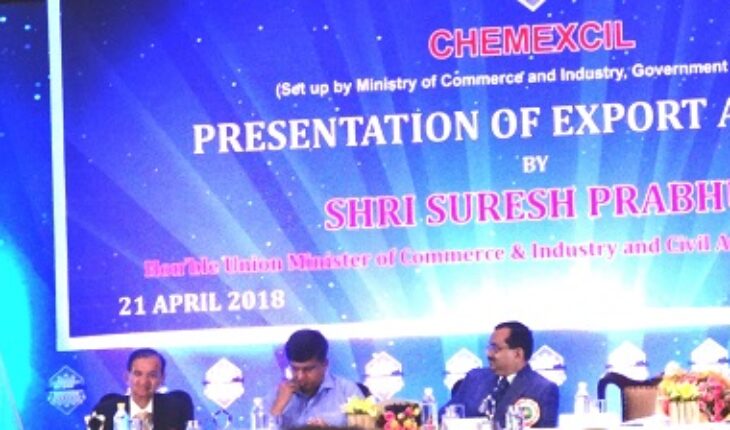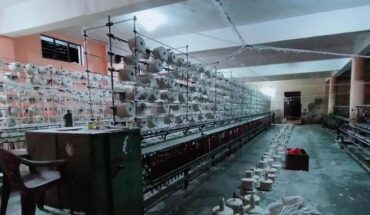Union Commerce Minister Suresh Prabhu called for setting up a “portal” in dealing with all foreign trade through “one window” to ease transactions of business in a manner which would make it ‘one-of-a-kind’ in the world. The Government has already approved the new ‘Industrial Policy’ for new investments coming into India and is doing everything possible to take India’s GDP higher than ever, he told a gathering of the CHEMEXIL Council at their Annual Export Awards here today.
However, the CHEMEXIL council should chalk out a plan that the Central Government could help them implement, because many strategic initiatives have been taken and not transformed into action, he said, adding “The country’s chemical sector has huge growth potential and needs to create capacity to meet export demand. This is possible through the large pool of entrepreneurs making sustained efforts to promote the chemical sector exports in coming days where its’ growth is expected to grow more than double and touch US$ 300 billion by 2025 from the present US$ 147 billion,” he said.
Describing GST as a very important issue, Prabhu said he took it up in October last year and addressed many of the related issues. “Please highlight your exact problems as the GST Council is a separate body and your issues are related to them. Don’t get bogged down and forget the bigger potential of the market,” he said.
The Minister asked the Chemexil Council to talk to the Chief Ministers of the six to seven States which had more representation in the GST Council than the Government. “You give your memorandum – which I have also seen – there and pursue your issue there,” he said.
Noting that India is one of the largest producers of agrochemicals in the world with a large export potential, he stressed on highlighting this sector as a very important activity as both – Commerce along with Chemical & Fertilisers Ministries – are together endeavouring to promote it. As many as 53 countries had come together at the WTO to discuss this relevant issue including exports related to the market, he said.
“We have a huge trade deficit with China and I invited a Chinese Minister to India – to my house – where we discussed it. So now you have to pursue this with Beijing,” he told the CHEMEXIL gathering while urging them to also look at trade with Japan, Korea, South-East Asia, Central Asia and even the Middle East where Abu Dhabi is contemplating investing tens of millions of dollars in India and Saudi Arabia has already announced US $ 45 billion investment in the country.
“We must promote India’s exports globally. We have come out with a strategy and are working on it where we are carrying out administrative changes and related marketing in a big way. While we are also working with bankers, you and the Government should focus on each one’s responsibilities in working towards a common goal.”
Assuring that the Government would provide an +enabling+ environment to the industry to increase the country’s exports, the Minister also cautioned them to bear in mind that +environmental+ issues would become more and more important, and for which more Research & Development had to be done.
Earlier, Satish Wagh, Chairman, CHEMEXIL, noted that supportive policy initiatives of the Government encouraged the Council’s star exporters to increase their share in the world market since India already had the talent, technology and infrastructure. CHEMEXIL’s exports in 2016-17 amounting to US$ 12.15 billion highlighted an increase of 4% in value terms over previous year exports of US$ 11.68 billion, he said, adding that taking into consideration the consistency and growth achieved in exports during last three years and the 2016-17 export figures, total 73 – including 2 Lifetime Achievement – awards had been conferred on the exporters.
In the midst of a present difficult global market, the value of Indian chemical exports have touched a growth of 18% at US$ 12.78 billion during April 2017 to February 2018 over the corresponding previous year, which augured well for future and a sign of recovery, he said while noting that while the value of the global chemical industry is estimated at US$ 4.3 trillion, the output of the Indian chemical industry – which is 3rd in Asia and 6th globally — at US$ 147 billion in 2015 is expected to grow at around 9% per annum over next five years.
India produces around 16% of the world’s dyestuff and dye intermediates, particularly reactive acid and direct dyes, while exporting around 50% of its agrochemicals production. The Indian chemical industry presently produces around 80,000 commercial products ranging from toiletries and cosmetics to plastics and pesticides, while being a capital-intensive industry that employs around two million people. Around half the industry is concentrated in Gujarat with other significant areas of production existing in Maharashtra, Rajasthan, Uttar Pradesh, Punjab, Tamil Nadu, Madhya Pradesh, Kerala and Andhra Pradesh.
The Make in India Initiative is expected to foster growth in Indian chemical industry by enabling duty rationalization for feedstock, improving infrastructure and R&D & skill development along with ease of regulation for setting up “Reverse SEZs” and tax incentives for R&D investments. To improve trade, a “Trust based Self ratification Scheme” has been introduced in mid-term review of FTP 2015-20 to allow duty-free inputs for export production under duty exemption scheme with a self-declaration. Under this scheme, instead of getting a ratification of the Norms committee for inputs to be used in the manufacture of export products, exporters will self-certify the requirement of duty free raw materials/inputs and take an authorization from DGFT.
As part of trade facilitation, CBIC has come out with guidelines for revised AEO scheme to provide further benefits to the entities who have demonstrated strong internal control system and willingness to comply with the laws administered by the Central Board of excise and Customs. Further, e-SANCHIT for online submission for documents under B/E will reduce transaction costs. This was in continuation to SWIFT (Single Window Interface for Facilitating Trade) which has been launched for enabling importers and exporters to file a common integrated declaration, instead of nine forms across six agencies. All these steps are in line with ease of doing business measures and saving transaction costs.





